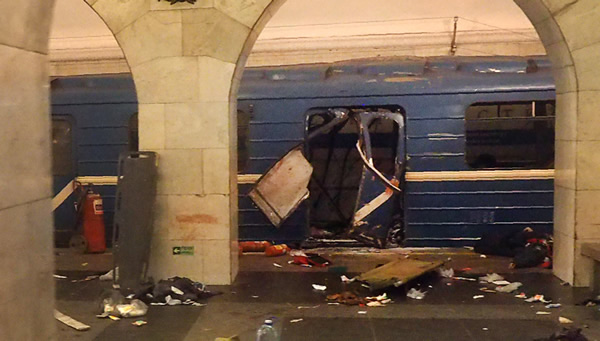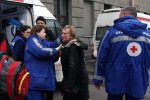President Vladimir Putin has called the bomb blast on a subway train in St. Petersburg, Russia that killed an estimated ten people and wounded as many as 50 more Monday, as a possible act of terror.
One of the blasts came from a device that appeared to be filled with shrapnel, Sky News reported. Putin said investigators were looking into all possible causes. An unexploded device turned up at a different subway station as crews worked to deactivate it, anti-terror officials said.
The unidentified explosive device blew up at 2:20 p.m. on a train that was leaving the Technology Institute station and heading to the Sennaya Square station, Russia’s National Anti-Terrorist Committee said. Photos and video from Sennaya Square appeared to show wounded victims on the smoke-filled platform, and a train car with a door blown out. Frantic commuters reached out through the doors and windows, shouting, “Call an ambulance!”
Seven people died at the scene of the blast while one died at a hospital and one died on the way to a hospital, David Filipov, Moscow bureau chief for The Washington Post, told Fox News’ “Happening Now.” Russian officials previously said 10 people had died.
“People were bleeding, their hair burned,” a witness told Russia’s Life News. “My girlfriend was in the next car that exploded. She said that he began to shake. When she came out, she saw that people were mutilated.”
Trains and train stations have been common targets for terrorist attacks in Russia and throughout much of Europe, analysts point out.
Double suicide bombings in the Moscow subway in March 2010 killed 40 people and wounded more than 100 people. Chechen rebel leader Doku Umarov claimed responsibility for that attack by two female suicide bombers, warning Russian leaders that “the war is coming to their cities.”
A high-speed Moscow-to-St. Petersburg train was bombed on Nov. 27, 2009 in an attack that left 26 dead and some 100 injured. Umarov’s group also said he ordered this attack.
Crews closed all subway stations in St. Petersburg Monday and evacuated passengers, administration officials said. Ambulances and other medical teams rushed to the scene.
Russia’s National Anti-Terrorism Committee vowed to tighten security at all of the country’s critical transportation centers.
St. Petersburg, Russia’s second-largest city with more than 5 million residents, is the country’s most popular tourist destination. The two stations that were the site of the blast are some of the subway’s busiest.
“The causes are not clear, it’s too early. We will look at all possible causes, terrorism as well as common crime,” Putin responded. “Law enforcement agencies and intelligence services are doing their best to establish the cause and give a full picture of what happened.”
The Russian president offered condolences to the families of the victims. He was visiting the city — his hometown — and held talks Monday with the president of Belarus, Alexander Lukashenko.
German Foreign Minister Sigmar Gabriel said he learned of the explosion “with deep sorrow.” He added that Germany’s thoughts were “with our friends in Russia, the victims and their families in this dark hour.”





